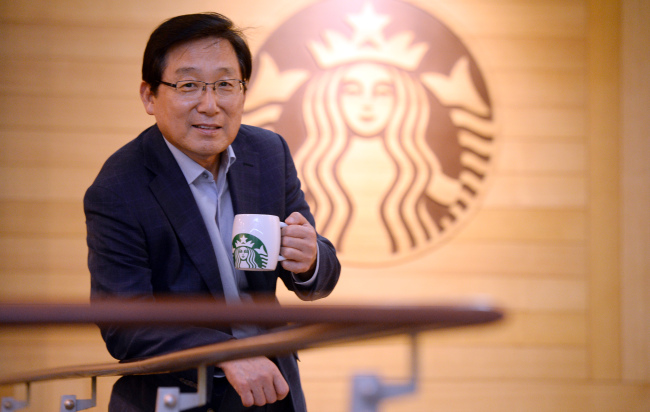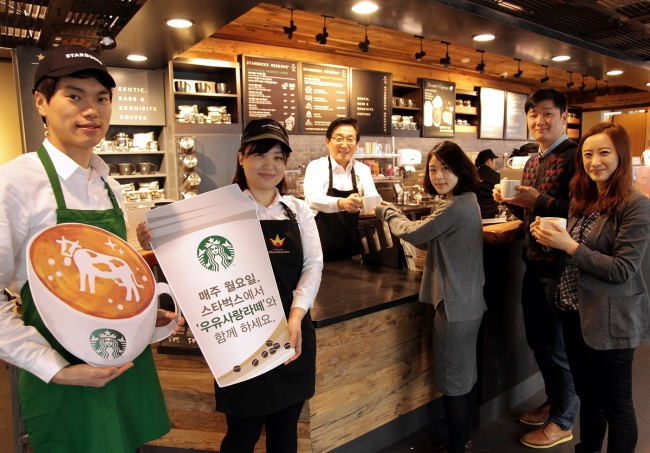Starbucks Korea chief highlights horizontal culture in management
By Korea HeraldPublished : June 12, 2015 - 21:11
Creating a horizontal culture in a Korean company is always easier said than done.
But Starbucks Coffee Korea CEO Lee Seock-koo has managed to defy that norm.
“Just call me SK … If my customers call me SK, I will be honored,” Lee said during an interview with The Korea Herald on Thursday. Sixty-five-year-old Lee is referred to as SK by 7,600 "partners" ― conventionally called staff in other firms ― of the company, without a prefix or job title.
“I think calling people by first names can consolidate the horizontal and equal culture in the company, which brings out changes and innovation within the organization. They are the essential elements in the growth of a company,” Lee said, explaining the reason behind the unusual policy.
“But in order to avoid the small awkwardness of people used to the Korean culture, we have adopted nicknames. Even on our online personnel system we have the partners’ official names and nicknames written together,” he said. All 7,600 workers are called by their English nicknames and those at coffeehouses wear name tags so that customers could also call them by their nicknames instead of “hey” or “excuse me.”

The naming convention is just a small part of Starbucks Korea’s endeavors to innovate through horizontal culture.
In order to grant transparency and equal access to information for all workers, the company holds its “Town Hall Forum” every Friday, where about 250 partners sit down and hold marathon discussions about 10-plus points on the agenda of the management.
Inspired by General Electric’s town hall meeting custom, every member ― from Lee to the newly-hired rookie ― gather at a large conference room and spends a full eight hours listening to project managers’ presentations followed by fierce question-and-answer sessions.
“We have even designated a devil’s advocate to assure that all agenda items could be contemplated from all aspects. Believe me, it is tough and not the ordinary top-down order system you would think,” Lee said. “But taking into account the benefits of assuring all workers that anyone could be engaged in major decision-making processes and knowing that they share in the back-and-forth, this is all worth it,” he said.
Lee occasionally holds a “Store Attack” program, where he serves coffee to partners at local stores. “For about half an hour we switch our roles ― I wear the black apron and brew coffee for those who serve coffee for the customers. We jokingly call it a ‘Star Starbucks,’” Lee laughed. He is also planning to install leg massagers at all outlets for the partners.
But this is more than just a surprise service. Lee said he is able to get firsthand anecdotes, complaints and suggestions from the field directly. “Such comments inspire me,” Lee said.
And having an “equal culture” has paid off.
Starbucks has managed to retain its leadership in the business that is regarded as a red ocean with more than 16,000 coffeehouses across the country. Starbucks Korea reported 169.6 billion won ($152.1 million) in sales and 6.5 billion won in operating profit generated from about 770 stores between January and March. It is a huge jump from having just 40 staff back in the opening year of 1999, and Starbucks Korea has been awarded by Cheong Wa Dae for its contribution to job creation.

First mover
With the help of staff who are not afraid to push new ideas, especially in the adoption of new technology involving digital devices, the company also became one of the first movers in the business.
The company adopted the Siren service which enables customers to preorder their drinks through a smartphone application and save time lining up at busy hours. “It was a groundbreaking idea because our solid business model was to create a brief but deep relationship between the coffee makers and customers through face-to-face time. But we had to admit the challenge: Women don’t mind lining up at lunch time but men are less patient and would easily choose to go to another coffee shop,” Lee said.
“It took about two years to develop the program, but as a result, we became the first among 66 countries with Starbucks flags to have adopted the mobile ordering service. About 60 percent of our customers now feel free to use smartphones as their payment tools and about 10-20 percent of mobile users choose to use the Siren service to avoid busy hours such as lunchtime or commuting hours,” he said.
At the company’s drive-thru outlets, a 42-inch screen is installed to let customers talk with the baristas in a semi-face-to-face form. Such service is the first of its kind in the world.
Also the company’s Call My Name service, which entitles partners to call the names of the customers instead of the conventional order number at the pick-up stand, met with rave reviews among people who wanted more personalized services.
Beyond coffee shop
Now that Starbucks Korea has become an unparalleled coffee store in Korea, Lee dreams more about sharing. The company has been sparing 2 percent of its income for corporate social responsibility activities.
Aligned with 120 nongovernmental organizations, Starbucks Korea runs a District CSR Specialist program, encouraging partners to actively engage in various charity programs. The company conducted a total of 1,430 cases of CSR activities through this program in 2014.
The company held a slew of public campaigns promoting homegrown agricultural products such as sweet potatoes, corn and potatoes as well as domestic milk. It also supported recycling coffee waste into fertilizer for farmers.
Beyond hiring 100 disabled partners without restricting their duties at all, the company established community stores to nurture local talents as well as senior citizens.
“Such CSR programs are important for the business side because coffee stores are always associated with the local community. It helps us stay alive,” Lee said. “But it is all about love for humans, humanity ― the spirit of Starbucks,” he said.
By Bae Ji-sook (baejisook@heraldcorp.com)
-
Articles by Korea Herald








![[KH Explains] No more 'Michael' at Kakao Games](http://res.heraldm.com/phpwas/restmb_idxmake.php?idx=644&simg=/content/image/2024/04/28/20240428050183_0.jpg&u=20240428180321)

![[Weekender] How DDP emerged as an icon of Seoul](http://res.heraldm.com/phpwas/restmb_idxmake.php?idx=644&simg=/content/image/2024/04/25/20240425050915_0.jpg&u=)








![[Herald Interview] Mistakes turn into blessings in street performance, director says](http://res.heraldm.com/phpwas/restmb_idxmake.php?idx=652&simg=/content/image/2024/04/28/20240428050150_0.jpg&u=20240428174656)
